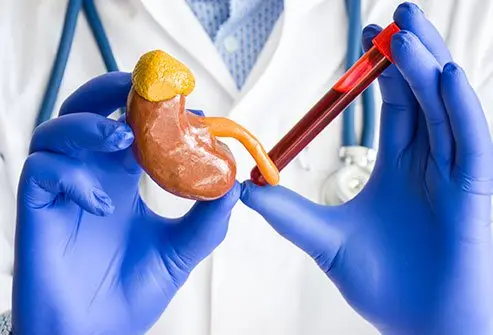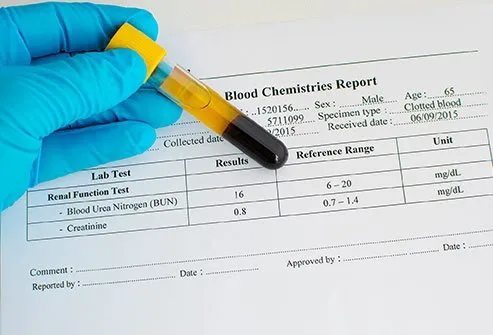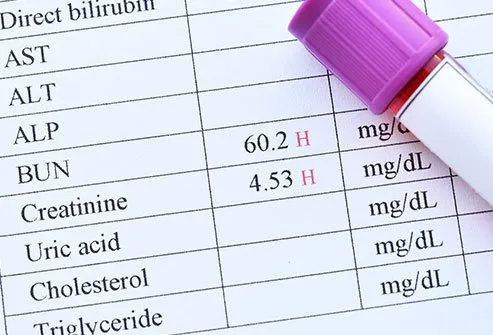What Is Creatinine and Why Are Blood Creatinine Levels Checked?
Blood creatinine levels are checked to assess kidney function.
Creatinine is a waste product in your blood that comes from normal muscle wear and tear. The kidneys are responsible for the removal of creatinine from the blood, so if your kidney function declines, creatinine levels in the blood rise.
Creatinine levels are checked to assess kidney function. They are usually checked with another kidney function marker called BUN, or blood urea nitrogen. These tests used together give an indication of overall kidney function, but the best way to know if your kidneys are working properly is to measure the glomerular filtration rate (GFR).
- GFR is a calculation that takes into account creatinine levels, along with age, gender, race, and weight.
- The GFR can be an indicator of renal disease.
- A GFR below 60 for three months or above 60 with signs of kidney damage (for example, protein in the urine is a sign of kidney damage) may be a sign of kidney disease.
What Are Normal Blood Creatinine Levels?
Your normal blood creatinine level will vary based on many factors.
Normal blood creatinine levels vary and depend on age, race, gender, and body size.
Normal serum creatinine ranges are:
- 0.6–1.1 mg/dL in women and adolescents aged 16 and older
- 0.8–1.3 mg/dL in men and adolescents aged 16 and older
- 0.2 or more in infants, depending on muscle development
Serum creatinine ranges are lower for women because women have less muscle mass and, thus, a lower rate of creatinine formation and excretion.
Normal blood creatinine levels also vary by race.
- For non-Hispanic blacks, the average blood creatinine is 1.25 mg/dL in men and 1.01 mg/dL in women.
- In non-Hispanic whites the mean blood creatinine levels are 1.16 mg/dL in men and 0.97 mg/dL in women
- In Mexican-Americans, the values are 1.07 mg/dL in men and 0.86 mg/dL in women.
What Are High and Low Creatinine Levels?
High creatinine levels can mean kidney damage or dehydration.
A high creatinine level is typically anything over 1.3 (depending on age, race, gender, and body size).
Certain conditions may cause a person to have higher than normal levels of creatinine.
- People with only one kidney may have a normal creatinine level of about 1.8 or 1.9.
- Creatinine levels of 2.0 or more in infants and 5.0 or more in adults may indicate severe kidney damage.
- People who are dehydrated may have elevated creatinine levels.
Low creatinine levels are often seen in patients with low muscle mass and are not usually considered a serious medical problem.
What Are the Symptoms of High Creatinine Levels?
Often high creatinine levels appear with no symptoms. Symptoms of high creatinine levels are typically those associated with kidney dysfunction (renal insufficiency). In many cases, there may be no symptoms that accompany high creatinine levels or kidney disease.
When symptoms of kidney disease or kidney failure (renal failure) occur, early symptoms may include:
What Causes High and Low Creatinine Levels?
Kidney infections and bladder problems can raise creatinine levels. Anything that impairs kidney function can raise blood creatinine levels.
Common causes of kidney damage or disease include:
Causes of low creatinine include low muscle mass, malnutrition, and liver disease.
Who Is at Risk for High or Low Creatinine Levels?
Certain individuals may have higher than normal levels of creatinine:
- Young or middle-aged adults who are muscular or athletic may have higher creatinine levels due to greater muscle mass
- Elderly people who are dehydrated or have infections may have elevated creatinine levels
Certain individuals may have lower than normal levels of creatinine, typically due to diminished muscle mass:
- Elderly people
- People who are malnourished or have experienced severe weight loss
- Chronically ill and/or bedbound patients
- People who are in wheelchairs
What Is the Treatment for High and Low Creatinine Levels?
If high creatinine levels are caused by kidney disease, the recommendations for treatment would include:
If creatinine levels are elevated from dehydration, rehydration is needed either via oral fluids or intravenously.
Medications that cause high creatinine levels may need to be changed or stopped. Talk to your doctor before altering or stopping any medications.
Other than for trying to increase muscle mass in general, low creatinine levels usually do not require treatment.
What Is the Prognosis for High and Low Creatinine Levels?
The prognosis for high creatinine levels depends on the underlying cause.
If high creatinine levels are due to kidney disease, it depends on the stage of the illness. Kidney disease often progresses slowly, and early stages may often be managed with a healthy diet, exercise, and proper medications. In later stages, dialysis or even kidney transplantation may be needed.
If creatinine levels are elevated due to dehydration, then rehydration often fixes the problem with no lasting effects.
Low levels of creatinine are usually not considered a serious medical problem. In cases where patients can increase muscle mass, this may be helpful.
Can Anything Be Done to Prevent High and Low Creatinine Levels?
The way to prevent high creatinine levels is to treat underlying cause.
Lifestyle changes to prevent kidney disease are the same as the steps taken to treat early stages of kidney disease:
- Consume a healthy, low-fat and low-salt diet.
- Exercise regularly.
- Maintain a healthy weight.
- Keep blood pressure in check.
- Control blood sugar if you have diabetes.
- Do not smoke.
- Limit alcohol intake.
To prevent low creatinine levels, performing weight-bearing exercises regularly may maintain or increase muscle mass.
Reviewed on 7/22/2022
References
American Kidney Fund. "Chronic kidney disease (CKD)." 2019. 30 July 2019.
<http://www.kidneyfund.org/kidney-disease/chronic-kidney-disease-ckd/#how_is_ckd_treated>.
American Kidney Fund. "Kidney Failure (ESRD) Causes, Symptoms, & Treatments." 2019. 30 July 2019.
<http://www.kidneyfund.org/kidney-disease/kidney-failure/>.
Inker, MD, MS, Lesley A and Ronald D Perrone, MD. "Assessment of kidney function." June 2019. UpToDate.com. 27 July 2019.
<https://www.uptodate.com/contents/assessment-of-kidney-function?search=normal%20serum%20creatinine%20level&source=search_result&selectedTitle=2~150&usage_type=default&display_rank=2>.
National Kidney Foundation, Inc. "Creatinine: What is it?" 2019. 27 July 2019.
<https://www.kidney.org/atoz/content/what-creatinine>.
Rakesh Vadde, MBBS. "Creatinine Clearance." 7 May 2013. 27 July 2019.
<https://emedicine.medscape.com/article/2117892-overview>.







